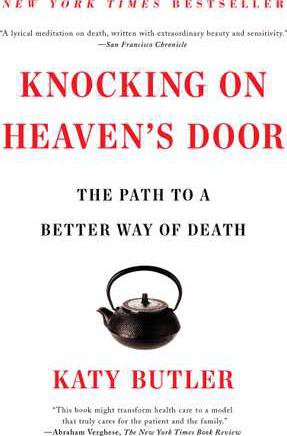"KNOCKING ON HEAVEN'S DOOR: The Path to a Better Way of Death," by Katy Butler, Scribner, $16, 352 pages (nf)
It just seemed logical to implant a pacemaker to strengthen Jeffrey Butler's too-slow heartbeat so he could have his hernias repaired. It never occurred to anyone — certainly not his wife, Valerie, or his adult daughter Katy — that the decision would later prolong his death as dementia, near-blindness and pain tormented him.
"Knocking on Heaven's Door: The Path to a Better Way of Death" is a wonderfully crafted, intensely human look at all the things that can go wrong at the end of life and the importance of starting early to preserve end-of-life decision-making. It is also a battle cry for "slow medicine," which the book describes as an attempt to reclaim so-called good deaths, unhampered by life-prolonging but not life-enhancing medical measures. At its very beautifully worded core lies the question of whether we should employ all means to save a life just because we can.
The book, which has become a best-seller in hardback, has now been released in paperback and has earned a lot of praise for its exploration of tricky end-of-life issues that most people will encounter in some form, often in conjunction with a beloved parent's decline in later years.
But it's also intimate and edgy, the writing exquisite. The lessons the Butlers learned linger because the reader comes to know and care for those engaged in the battle to help Jeffrey, and later Valerie, die well, which is an established and time-honored concept that is often difficult to achieve.
"The default pathway to a disempowered death is a wide freeway with smooth, well-lit on-ramps and misleading signage about the final destination," Katy Butler writes near the end of the book. "Over time, the cars on that freeway move faster and the off-ramps grow fewer, and you may find yourself funneled toward a single stopping point, a never-say-die death in intensive care. There, at the very last moment, unfamiliar doctors may off-load onto your relatives the crushing moral burden of assenting to the discontinuance of life support."
This is an excellent read even if one is not contemplating how best to manage the end of life. But for those who are, it's rich with solid information that includes recent research and a strong list of resources, as well as easy-to-understand discussion of topics ranging from living wills and advanced directives to how a book club might use the hard lessons it conveys.
This is an important discussion conveyed honestly and tenderly.
The language is clean, and the medical descriptions are matter-of-fact and without any unnecessary elements.
Email: lois@deseretnews.com, Twitter: Loisco





